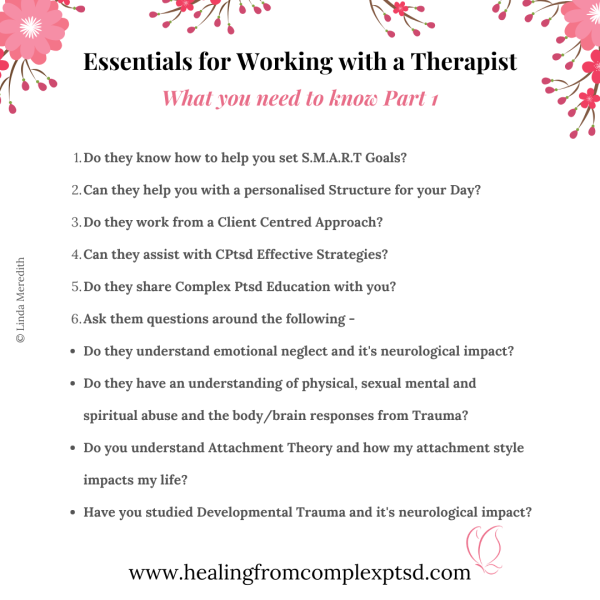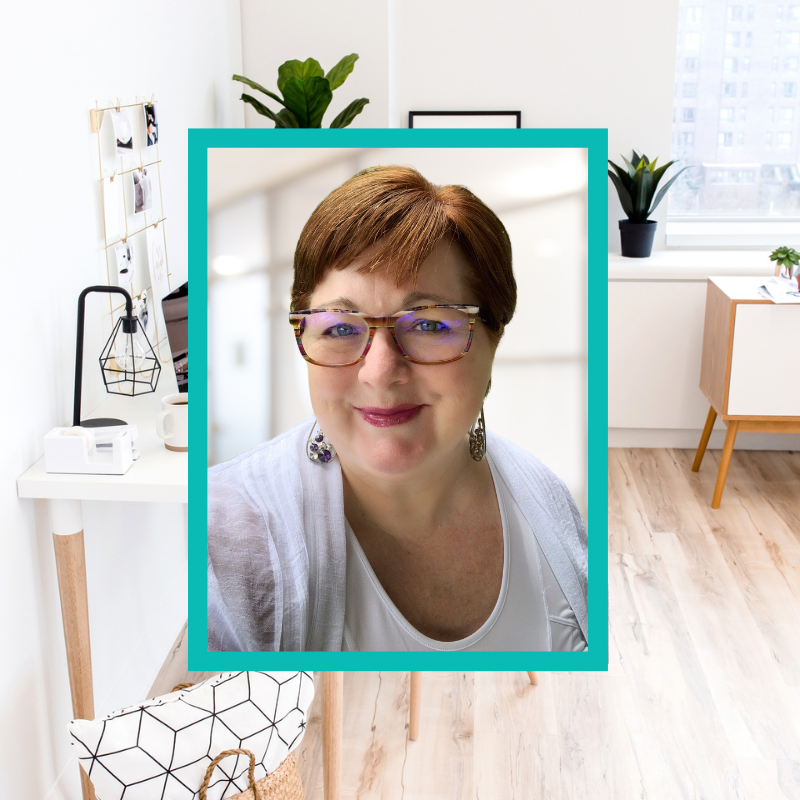Essential Questions for a Potential CPtsd Coach/Therapist
This article was posted on our original blog at Healing from Complex ptsd, April 11th 2020.
Essential Questions for a Potential CPtsd Coach/Therapist
How can we begin to identify a good Complex Trauma Coach/Therapist?
How can we absolutely identify if a Trauma Coach and/or Therapist is going to be able to take us from Survivor to Thriver? Especially when Complex Trauma coaching/therapy has to be applied differently for each individual?
Answer: We need to know what questions to ask
I've put together this infographic you can download and save to your phone from the Free Complex Ptsd Resource Library. This will make it easier to have on hand whether you're in person, on the phone or checking out the Coach/Therapists website.

What does "advance in your recovery" mean?
This means you will not be spending endless years in coaching/therapy and not getting any better. Complex Ptsd recovery happens when we are Equipped with information, Educated on what we need to know and Encouraged and supported in a safe environment to take your one next step.
There are other questions we need to ask as well.
I assembled some more essential questions available for free here. You'll be able to download the pdf OR download the infographics to your phone to have them on hand. All free.
Use the questions to scan their website and see if they are upfront in answering your initial questions without having to contact them. There is no room for games in Complex Ptsd recovery. Upfront and honest is what we need.
Now we know you can recover, your brain can heal, from Developmental Trauma you want the best person to walk with you.
Also look on their website for client reviews. These will help you discover what kind of Coach/Therapist you may work with. Looking at my client reviews you'll notice key themes around how the work I do with clients, works.
Pay close attention to whether the Therapist is getting results. And also if they mention on going learning in Trauma as well. We don't have a lot of time, but we do have a professional requirement to make time for continued education.
Asking questions may not be something we've learnt to do as adults due to our developmental trauma, but it is something we can learn to do.
Have you considered your needs when working with a Coach/Therapist?
If you can, sit with your feelings and write them down. See if they sound similar to these, and note your differences.
I need someone to feel safe with
I need someone who is an encourager
I need someone who will be empathic but also tell me what I need to know
I need someone who understands what I don't understand as yet
I want someone who is caring
I want someone who knows how I feel.
If you're having a hard time getting into your feelings that's okay. Try writing this list out and feeling these feelings, then keep writing after you've written the last one on the list.
This is a healthy way of getting in touch what what you need AND what you want too. We are allowed to have both needs and wants in our potential long term relationships.
Please feel welcome to reach out to me if you have further questions. New information in treating Complex Ptsd is coming to hand frequently.
Blessings and dreams, they do come true!
Linda
Courses
Let's Create Generational Change Together
To support this goal, Healing from Complex Ptsd allows you to:
- Access professional education and business support from industry leaders
- Learn a results driven approach to CPtsd recovery
- Discover a full library of ready to use tools and resources
Popular courses
Terms and Conditions
Developmental Trauma Self-Check
Over the past 12 months, how many and how often have you noticed:
-
I work hard to hold it together in public, then crash in private.
-
I struggle to name what I feel until it overloads me.
-
I say yes to keep the peace, then feel resentful or empty.
-
I feel loyal to people who do not treat me well.
-
I lose time or feel foggy when stressed.
-
I avoid closeness or over-attach quickly, then panic.
-
I find it hard to trust my own judgement.
-
I feel shame when I try to set boundaries.
-
I need external approval to feel steady.
-
I push through fatigue instead of pausing.
How to use this:
0–3 items often: you may be using a few survival patterns.
4–7 items often: consider paced support to rebuild safety and choice.
8–10 items often: a trauma-trained professional can help you restore stability and connection.
Brain Impact Self-Check
Over the past 12 months, how often have you noticed:
-
My mind jumps to what could go wrong, even in safe moments.
-
I find it hard to remember recent details when I am stressed.
-
Decisions feel risky, so I delay or avoid them.
-
I forget good experiences quickly and dwell on the bad.
-
I feel numb or overwhelmed, with little in-between.
-
I lose words when emotions rise.
-
I misread neutral faces or tones as negative.
-
I struggle to notice body signals like hunger, tension or breath.
-
I do better when someone I trust is nearby.
-
I feel different “versions” of me in different settings.
How to use this:
0–3 often: some protective habits; gentle self-care may help.
4–7 often: consider trauma-trained coaching to build daily brain skills.
8–10 often: a paced, brain-based plan can restore clarity, memory and confidence.
For formal assessment, use recognised measures:
-
ACE-IQ or ACE-10 for adversity history (education only on public pages).
-
ITQ (International Trauma Questionnaire) for ICD-11 PTSD/Complex PTSD.
-
DERS for emotion regulation, DES-II for dissociation, PCL-5 for PTSD symptoms.
-
PHQ-9, GAD-7 for mood and anxiety; OSSS-3 for social support.

